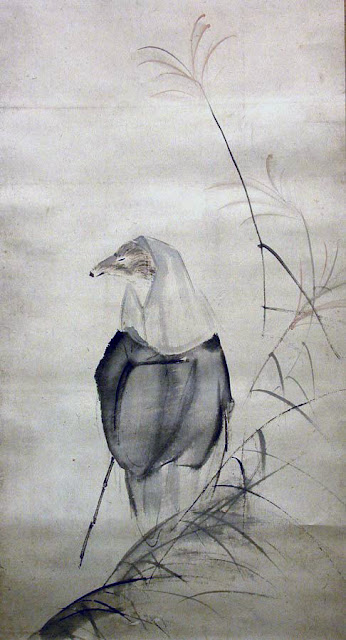The Zen rebels: obscure hermits and existential reformers (part 19). Zen Female Masters - Rengetsu (part 2)
"A trickster in Sagano fields
at twilight
my tail in plumes of grass
— Will it look like a sleeve?"
(Image and script: Ōtagaki Rengetsu 1791–1875)
The great Chinese Ch'an masters, also taught that Zen holds a paradox. This was important in the transmission and teaching of what Zen means and of course, the meaning in this paradox remains illusive for the entirety of its practice. Which was important, as Zen and Ch'an masters of old would rebuke a student whose sole desire would be to reach enlightenment as a gratification, focused on Zen as the all and everything that is of life. In some cases they critique the student for relying too much on sitting meditation, seeing how overly earnest they've become – the Master would clarify this as the ego mind is still persistent and it haunts even in the stillness of meditation. With this, the penetration of mind has not be reached and they are still enveloped in delusion. From these techniques from the masters to the students, they would prescribe that we are all deluded, contradictory and paradoxical. That we think we understand the nature of things by grasping onto them, letting go of that desire, allows all things to pass through, the highs and the lows. Bliss and pain. But, only the practitioner can know and see this, the teacher directs.
From what I feel in regards to the Zen Buddhist nun Otagaki Rengetsu (1791-1875), who in action, practiced her disciplined as a tangible exercise - was a pure understanding of Zen. She was incredibly talented and focused producing ceramics, from teapots to Sake bottles, each with a written poem inscribed on the side of the poetry. Her prose, released as a simplicity and elegance. Was her lifeblood of expression, which does not have to be a multitude of words and actions, this can also be seen in her art. Yet, Rengetsu's meditation was in a persistent creation. The brush stokes, subtle, yet also with an impact of resolve, in an astoundingly beautiful and serene projections. This is Zen, her version, Rengetsu's dynamic. Knowing death, seeing the tragedy unfold as a young woman, losing all her children to illness. Developing techniques of ceramic making, casting away the doubts, not absorbed of the self. Aware of pain and joy. Rengetsu creates within a freedom of mind.
---
My wish is to see
a cloudless moon
above the lotus flower
in my next life.
Otagaki Rengetsu. Death Note (d1875)
a cloudless moon
above the lotus flower
in my next life.
Otagaki Rengetsu. Death Note (d1875)





Comments
Post a Comment